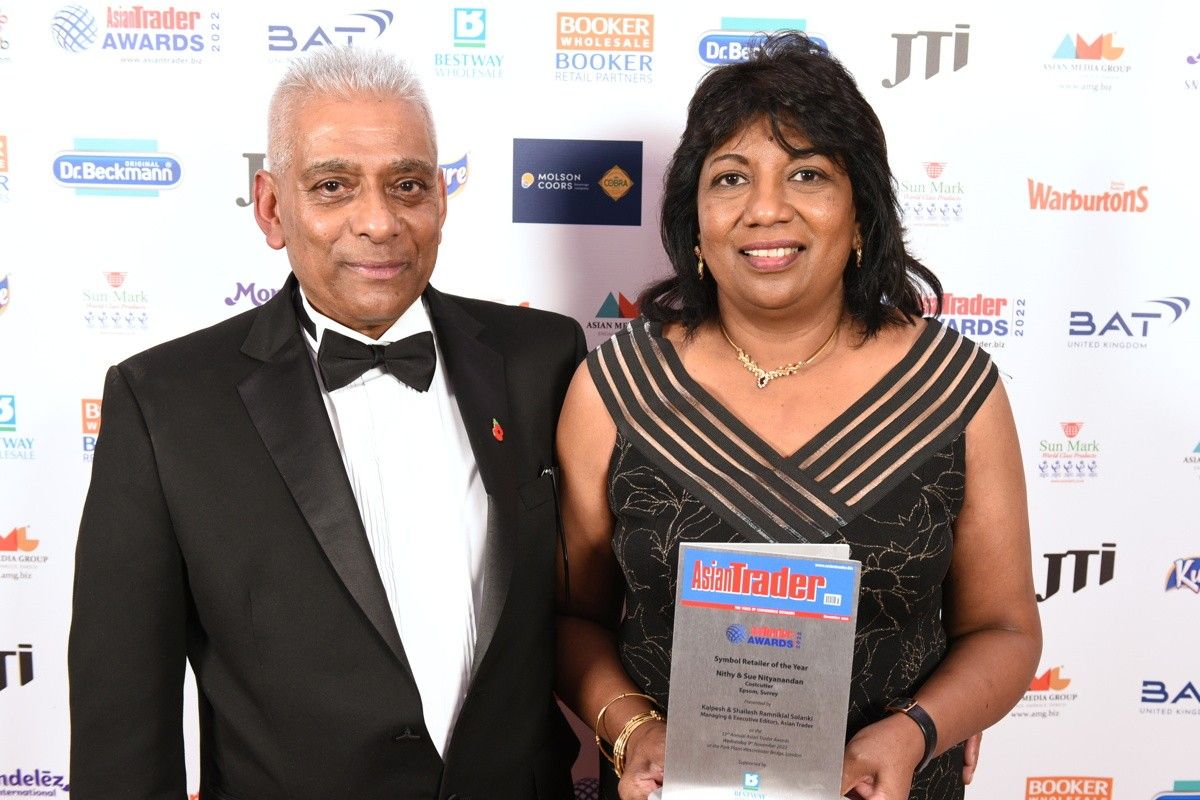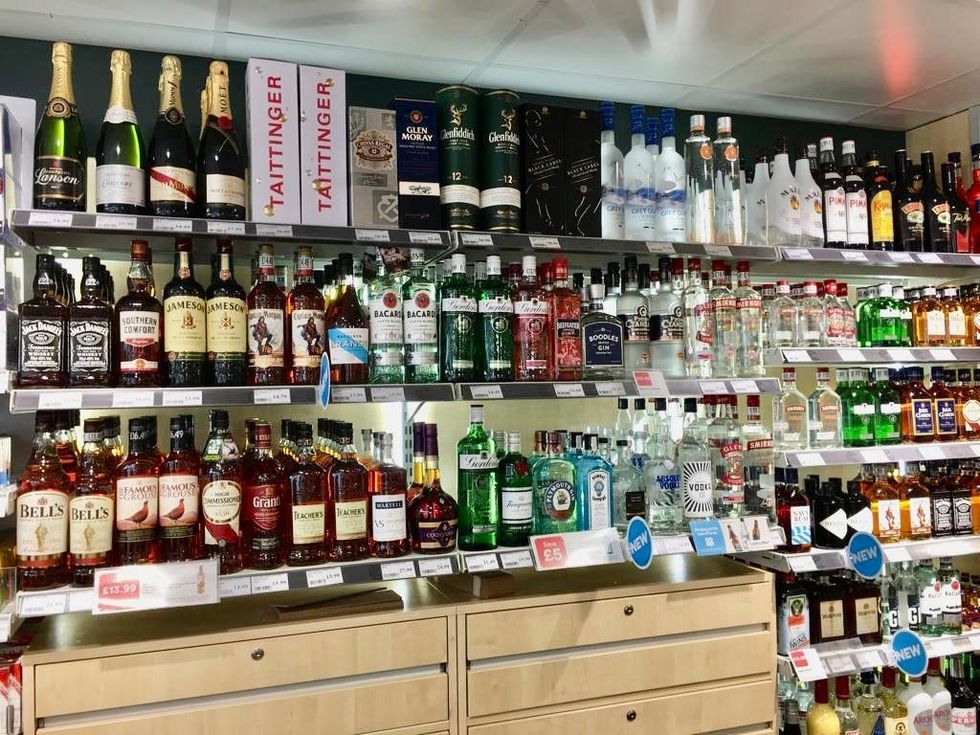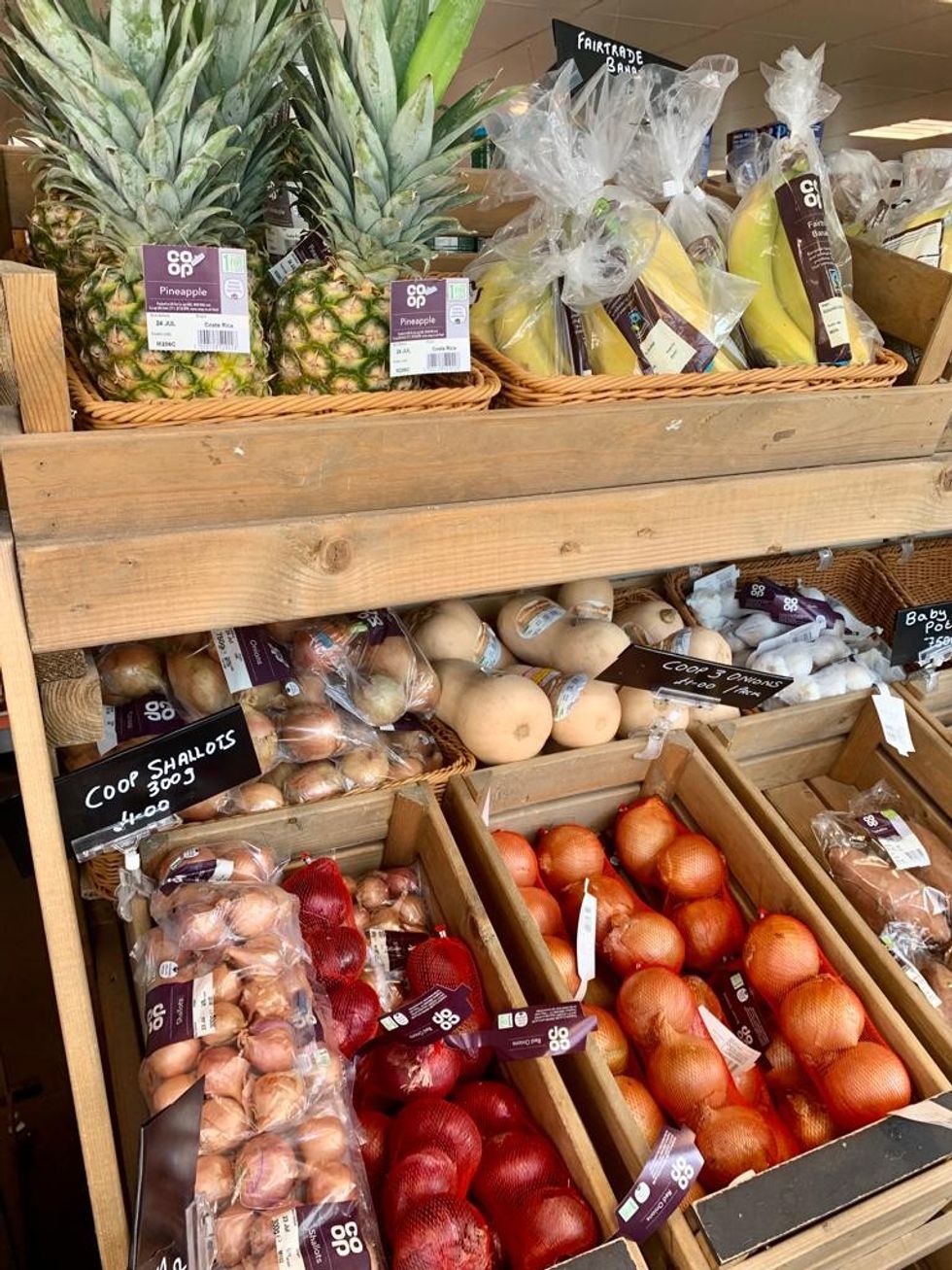“Little drops of water, Make the mighty ocean”, Julia Carney’s immortal lines speak to the significance of small things in life, and for Nithy and Sue Nityanandan, who run the Costcutter store in Epsom, Surrey, it also signifies an approach to success in convenience retailing.
“To us, the qualities that we feel important are an amalgamation of many different aspects of community/customer service, product range, sustainability, tech application and customer contact that all come together to form a cohesive service,” they say.
It’s this amalgamation of many small things that makes their store so special, and that won them the Symbol Convenience Retailer of the Year Award at the 2022 Asian Trader Awards.
Nithy and Sue are totally embedded in the local community, putting customers at the very forefront of everything they do. The store itself is stunning with a floor to ceiling glass front, bright, clean fixtures and immaculate merchandising.
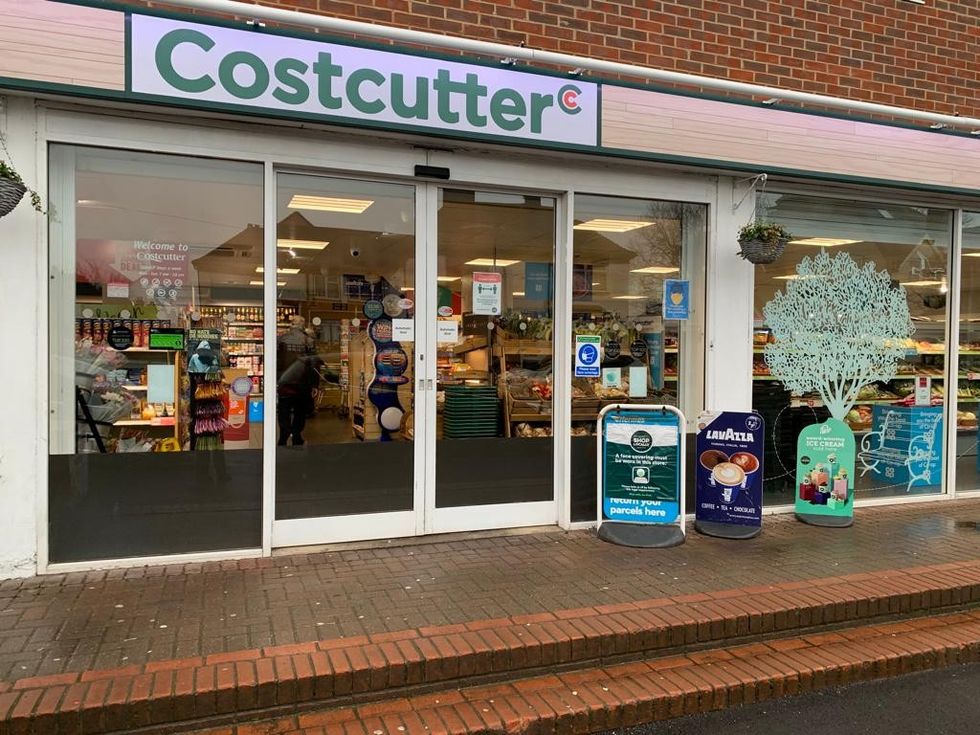
The husband and wife team started with a petrol station in Coulsdon, Surrey in 1984, and since then they have been working to a philosophy of striving for continuous improvement.
“Every time we find a way to add further value – we welcome the opportunity,” they say. The Coulsdon site was one of the earliest petrol stations to feature a supermarket on the premises, and they were the first petrol station in London Borough of Croydon to get an alcohol license.
They ran the Coulsdon store for almost three decades, divesting it in 2013. They have been running the Epsom store since 2010, and they work with their partner Costcutter to leverage every means at their disposal to achieve the aim of “continuous improvement”, and this partnership spans across “service excellence, ongoing launch of new features to respond to the complex market conditions, the product range we offer, (and maintaining product availability), and increasingly in our sustainability approach,” they say.
“We opened up the first Costcutter store in the petrol station in the year 1999. So we have been dealing with them for over two decades actually. They have been really good to us. We learned a lot of retail through them, especially all different categories,” they add.
In fact, it was the symbol group that asked them whether they would like to take the premises of their present store, which was a completely new development, and turn it into a Costcutter. And they believe Costcutter offers the best support package for indie retailers.
“We always keep an eye on what other symbols offer and it consistently brings us back to Costcutter,” they say. “They have the right ideas and they have all the tools for a very successful retail if you learn how to use it. As a retailer you have to make a big effort to learn their methods, like their promotions and their categories, etc. They are very much supportive for a successful business.”
They say the support from the Costcutter team throughout the challenges of recent times has been tremendous.
“With Costcutter now part of the Bestway Retail family we are already seeing the benefits of being part of the Bestway Group, that champions independent retailers. This, along with Costcutter’s wholesale supply deal with the Co-op and the availability and quality of Co-op Own Brand has been fundamental to our success. They're very good value for money, especially at present, with the cost of living crisis,” they explain.
“The ability to serve our shoppers’ needs for a full shop, especially with fresh products, has proved vital in maintaining shopper loyalty among old and new shoppers alike,” they add.
The tech advancements that they have mobilised with the help of Costcutter also helps the business greatly. “We have adopted the new stock management and automatic updates, ordering and pricing. It has returned time back into the business which means we can spend more time with customers at the front end and supports our efficiencies within the business,” they say.
Tackling energy bills
As the ever-increasing input costs put a strain on the business, they have cut back in different ways, and their new refrigeration has proven quite a success.
“We have put completely new equipment. All our chillers are with automatic doors, we did it a year ago, and that has reduced our energy consumption by about 15 to 20 per cent,” they reveal.
“Plus the visibility was very good and we had lots of extra space as well. So the sales went up about 10 per cent on fresh and chilled, and then contributed to other things because people don't only come for the chilled: I mean the basket spend went up.”
They have been working to improve their general emissions as a store, and making the move to reduce the energy costs has become a big decision-maker in what they do next, knowing it will impact both on their costs and their aim to reduce emissions.
“Our big first step is the new refrigeration we have had put in which are all more effective in consumption of electricity as well as opting for automatic doors and closure on the chillers to help reduce the amount of electric being used,” they explain further.
“Additionally, we have looked at what the latest lighting solutions can offer us. As a result, we have implemented better options throughout the store including timers on electrical units that don’t need to run 24/7.”
Nithy and Sue say these types of efficiencies are going to become increasingly important to retailers generally to counter some of the market turbulence the retailers are experiencing. But they are also worried about the level of investment that it may demand – costs that impact on already tight margins. Still they assert the importance of investing in the shop.
“Because after some time, the shops will get tired. Especially refrigeration, and lighting, the electricity is very important, that takes the most chunk of the cost. You must put aside a certain amount of funds for this development, if you're going to do the business in foreseeable future,” they affirm.
A community store
The Nityanandans describe theirs as a “forward-thinking, well-rounded store” that serves the community in the best way possible.
“The personal engagement and connection with our customers underpins everything that we do. This is helped by having one of the best teams in the business,” the couple says.
They are in a residential area and near to five schools, and the store is a strong pillar of support to them.
“We get most of the parents and the people come from the five schools. We support all five schools, we do fund them up to a certain extent. Whatever they want to do like Christmas or they want to do a project or anything like that we are always in the front to support them, and we have a couple of churches that come and ask for our help, mental health issues and everything. We help them. So we are mostly like a community shop rather than a supermarket,” they explain.
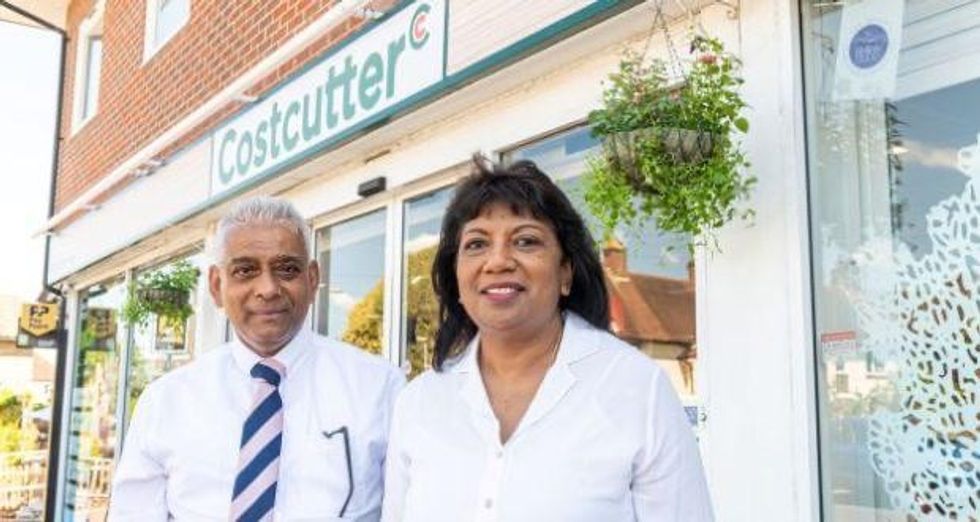
Nithy and Sue believe firmly in the duty of care, and complied with the HFSS regulations even though they were advised that they would be exempt from its scope.
“We are very particular that we keep up to certain amount of HFSS rules in the shop and the duty of care,” they say.
“Overall, we have reviewed our range and looked at healthier options for both general snacking and meal solutions. It’s not just about the range, it’s also about the location of products to comply with the legislation. This has meant removing popular counter lines and looking into what new impulse products can be promoted on the promotional end bays as well as our counter and queuing sections to influence and shift the normal buying patterns.”
Also, they did not limit this progressive approach to the new legislation to the store. As part of their adoption of the HFSS rules, they worked closely with local schools, helping educate children in areas of nutrition and healthy eating. “We go into schools to talk – we welcome children into our store and talk to them around nutrition and we provide healthy food to schools,” they add.
Lifelong shoppers
So, the community stands behind them solidly, forming a loyal customer base. As with many local convenience stores across the country, they attracted new shoppers and increased sales during the pandemic. But, bucking the trend post-pandemic, their sales have now further increased.
“We never closed our shop even one day during the pandemic. We shortened the hours and we operated every day. People do remember that. And if you have a good shop with all the availabilities, because we do have everything, availability is excellent, over 94-95 per cent, those customers came back to us,” they say.
“So we are doing even sort of better situation than the pandemic time on the sales wise. Actually our sales have gone up after the pandemic. Because they say this shop got everything, and the prices are good, services are good.So, they are all coming back to us.”
Turning the new lifeline shoppers of the pandemic into lifelong shoppers has been the stated mission for Costcutter, and Nithy and Sue indeed demonstrate the kind of retailing needed to achieve that mission, and that too from a challenging trading area, with a Tesco, Sainsbury’s, Lidl and Co-op nearby.
And the veteran retailers say it has been an adventure all the way, and they would suggest any upcoming retailers to treat it as an adventure. “And if you do it right, it will give you lots of rewards,” they sum up.

